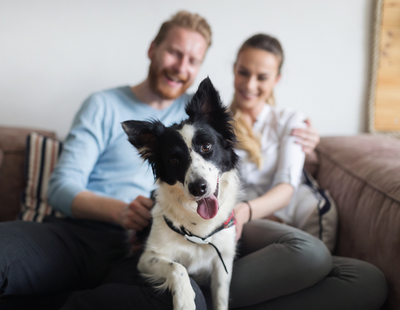
Agents and landlords are advised to think carefully before allowing tenants to keep pets, despite a government push to relax restrictions.
The advice comes from inventory provider No Letting Go, and follows last month’s announcement by the Ministry of Housing, Communities and Local Government that a new model tenancy agreement would include provision for tenants to keep pets.
Housing Secretary Robert Jenrick says he wants more landlords 'catering for responsible pet owners' and wants to increase the number of rental advertisements that are clearly pet-friendly - the figure now is just seven per cent.
Jenrick suggests the revised model agreement would stipulate that total bans on renters with pets should only be implemented where there is a good reason, such as a property being too small or having no outside space.
“For those landlords that choose to follow the government's model tenancy, there could be several grey areas around which types of pets they have to accept and what constitutes a well-behaved pet” explains No Letting Go founder and chief executive Nick Lyons.
"Something like the behaviour of an animal is subjective, so it's easy to envisage problems arising when tenants keep pets and things don't go to plan.
"If tenants are able to argue that their pets are 'well-behaved', it may be harder for a landlord to successfully make deductions from a security deposit where damage is caused” he says.
Lyons says these grey areas over liability of damage could cause financial problems for landlords.
"At this stage, we’re also wondering what would happen to a deposit and the liability for damage if pets were introduced during a tenancy," he adds.
"Due to the variables of rental properties, animals and tenants themselves, it seems only right that landlords are able to make decisions on accepting pets on a case by case basis, rather than having to accept all pets within a certain framework if they choose to follow the model tenancy agreement."
No Letting Go says that landlords following the model tenancy agreement once it is revised will need to make sure they have the relevant pet protection in place.
This includes suitable insurance and detailed and independent inventories carried out at the start and finish of a tenancy. What’s more, if they do choose to accept pets, they will need to monitor the condition of their property effectively through mid-term inspections.
"A thorough inventory could help a landlord to prove any damage and whether a pet has been ‘well-behaved’. This sort of information could be crucial in costs of repairs from tenants’ deposits” says Lyons.
"Due to the Tenant Fees Act, landlords can no longer charge higher security deposits to tenants with pets. Therefore, they must take a range of other steps and measures if they want to keep their property safe while tapping into the growing number of tenants who want to keep pets” he concludes.













%20-%20IMAGE%20Client%20Accounting%20%E2%80%93%20what%20are%20your%20options.jpg)

%20(002).png)
.png)
.png)

%20(002).jpg)







Join the conversation
Jump to latest comment and add your reply
An advertorial winning the Febriary award for stating the bleein' obvious and advertising his inventory firm.
"Due to the variables of rental properties, animals and tenants themselves, it seems only right that landlords are able to make decisions on accepting pets on a case by case basis". Do landlords and agents not do this already? I expect to see how well behaved the dogs are and the children if any. I have stopped more viewings with uncontrollable children than dogs!
Unfortunately I cannot, because of head lease clauses, permit pets in some of my flats, but my former family home (a semi-detached house) has always had tenants with pets.
In our experience, children are more likely to cause damage to property than pets!
I have owned many of both, and there is always collaterol damage to door frames, window cills, furniture, carpets, kitchen cupboards, gardens, as these are animals after all, who do animal type stuff and whose hygiene standards are pretty poor. Noone is to blame, tenants are not being irresponsible, that's just what happens, but someone has to pay for it. There is no such thing as a well behaved or genetically altered dog or cat; even a responsible pet owner cannot prevent the inevitable extra dilaps and wear and tear.
I put up with it in my own house, but I wouldn't in a buy to let, unless the tenant was prepared to contractually remedy. I am not sure what Robert Jenrick is expecting to change. He wont convince anyone that a property will be returned in the same condition ever, so Landlords just have to foot the bill? I think more likely, landlords will continue their pet ban, the RSPSA are going to be busy over the next couple of years until the government amends the legislation to allow some kind of separate bond for pets.
Please login to comment